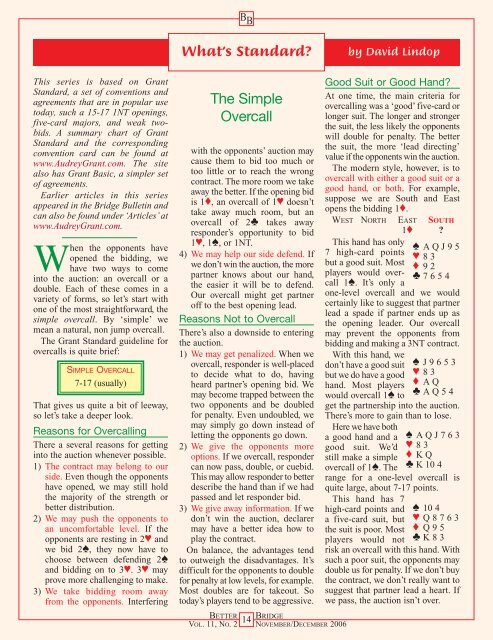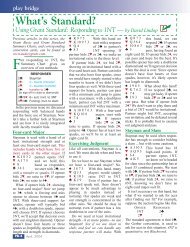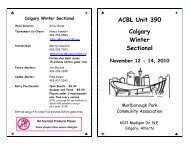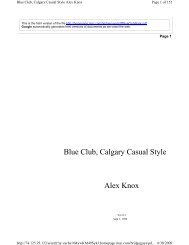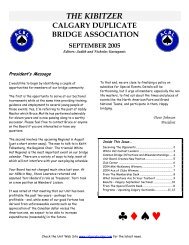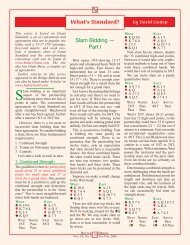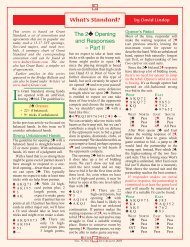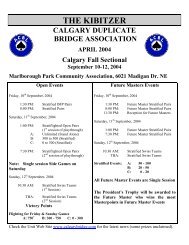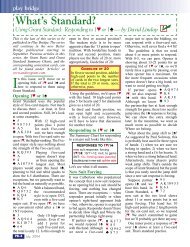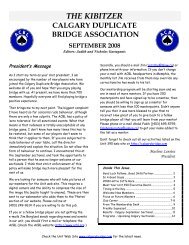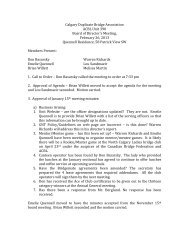What's Standard? The Simple Overcall - Better Bridge
What's Standard? The Simple Overcall - Better Bridge
What's Standard? The Simple Overcall - Better Bridge
You also want an ePaper? Increase the reach of your titles
YUMPU automatically turns print PDFs into web optimized ePapers that Google loves.
B B<br />
What’s <strong>Standard</strong><br />
by David Lindop<br />
This series is based on Grant<br />
<strong>Standard</strong>, a set of conventions and<br />
agreements that are in popular use<br />
today, such a 15-17 1NT openings,<br />
five-card majors, and weak twobids.<br />
A summary chart of Grant<br />
<strong>Standard</strong> and the corresponding<br />
convention card can be found at<br />
www.AudreyGrant.com. <strong>The</strong> site<br />
also has Grant Basic, a simpler set<br />
of agreements.<br />
Earlier articles in this series<br />
appeared in the <strong>Bridge</strong> Bulletin and<br />
can also be found under ‘Articles’ at<br />
www.AudreyGrant.com.<br />
When the opponents have<br />
opened the bidding, we<br />
have two ways to come<br />
into the auction: an overcall or a<br />
double. Each of these comes in a<br />
variety of forms, so let’s start with<br />
one of the most straightforward, the<br />
simple overcall. By ‘simple’ we<br />
mean a natural, non jump overcall.<br />
<strong>The</strong> Grant <strong>Standard</strong> guideline for<br />
overcalls is quite brief:<br />
SIMPLE OVERCALL<br />
7-17 (usually)<br />
That gives us quite a bit of leeway,<br />
so let’s take a deeper look.<br />
Reasons for <strong>Overcall</strong>ing<br />
<strong>The</strong>re a several reasons for getting<br />
into the auction whenever possible.<br />
1) <strong>The</strong> contract may belong to our<br />
side. Even though the opponents<br />
have opened, we may still hold<br />
the majority of the strength or<br />
better distribution.<br />
2) We may push the opponents to<br />
an uncomfortable level. If the<br />
opponents are resting in 2♥ and<br />
we bid 2♠, they now have to<br />
choose between defending 2♠<br />
and bidding on to 3♥. 3♥ may<br />
prove more challenging to make.<br />
3) We take bidding room away<br />
from the opponents. Interfering<br />
<strong>The</strong> <strong>Simple</strong><br />
<strong>Overcall</strong><br />
with the opponents’ auction may<br />
cause them to bid too much or<br />
too little or to reach the wrong<br />
contract. <strong>The</strong> more room we take<br />
away the better. If the opening bid<br />
is 1♦, an overcall of 1♥ doesn’t<br />
take away much room, but an<br />
overcall of 2♣ takes away<br />
responder’s opportunity to bid<br />
1♥, 1♠, or 1NT.<br />
4) We may help our side defend. If<br />
we don’t win the auction, the more<br />
partner knows about our hand,<br />
the easier it will be to defend.<br />
Our overcall might get partner<br />
off to the best opening lead.<br />
Reasons Not to <strong>Overcall</strong><br />
<strong>The</strong>re’s also a downside to entering<br />
the auction.<br />
1) We may get penalized. When we<br />
overcall, responder is well-placed<br />
to decide what to do, having<br />
heard partner’s opening bid. We<br />
may become trapped between the<br />
two opponents and be doubled<br />
for penalty. Even undoubled, we<br />
may simply go down instead of<br />
letting the opponents go down.<br />
2) We give the opponents more<br />
options. If we overcall, responder<br />
can now pass, double, or cuebid.<br />
This may allow responder to better<br />
describe the hand than if we had<br />
passed and let responder bid.<br />
3) We give away information. If we<br />
don’t win the auction, declarer<br />
may have a better idea how to<br />
play the contract.<br />
On balance, the advantages tend<br />
to outweigh the disadvantages. It’s<br />
difficult for the opponents to double<br />
for penalty at low levels, for example.<br />
Most doubles are for takeout. So<br />
today’s players tend to be aggressive.<br />
BETTER<br />
VOL. 11, NO. 2<br />
14<br />
BRIDGE<br />
NOVEMBER/DECEMBER 2006<br />
Good Suit or Good Hand<br />
At one time, the main criteria for<br />
overcalling was a ‘good’ five-card or<br />
longer suit. <strong>The</strong> longer and stronger<br />
the suit, the less likely the opponents<br />
will double for penalty. <strong>The</strong> better<br />
the suit, the more ‘lead directing’<br />
value if the opponents win the auction.<br />
<strong>The</strong> modern style, however, is to<br />
overcall with either a good suit or a<br />
good hand, or both. For example,<br />
suppose we are South and East<br />
opens the bidding 1♦.<br />
WEST NORTH EAST SOUTH<br />
1♦ <br />
This hand has only<br />
7 high-card points<br />
but a good suit. Most<br />
players would overcall<br />
1♠. It’s only a<br />
one-level overcall and we would<br />
certainly like to suggest that partner<br />
lead a spade if partner ends up as<br />
the opening leader. Our overcall<br />
may prevent the opponents from<br />
bidding and making a 3NT contract.<br />
With this hand, we<br />
don’t have a good suit<br />
but we do have a good<br />
hand. Most players<br />
would overcall 1♠ to<br />
get the partnership into the auction.<br />
<strong>The</strong>re’s more to gain than to lose.<br />
Here we have both<br />
a good hand and a<br />
good suit. We’d<br />
still make a simple<br />
overcall of 1♠. <strong>The</strong><br />
♣ K 10 4<br />
range for a one-level overcall is<br />
quite large, about 7-17 points.<br />
This hand has 7<br />
high-card points and<br />
a five-card suit, but<br />
the suit is poor. Most<br />
players would not<br />
♠ AQJ 9 5<br />
♥ 8 3<br />
♦ 9 2<br />
♣ 7 6 5 4<br />
♠ J 9 6 5 3<br />
♥ 8 3<br />
♦ AQ<br />
♣ A Q 5 4<br />
♠ A Q J 7 6 3<br />
♥ 8 3<br />
♦ KQ<br />
♠ 10 4<br />
♥ Q 8 7 6 3<br />
♦ Q 9 5<br />
♣ K 8 3<br />
risk an overcall with this hand. With<br />
such a poor suit, the opponents may<br />
double us for penalty. If we don’t buy<br />
the contract, we don’t really want to<br />
suggest that partner lead a heart. If<br />
we pass, the auction isn’t over.
B B<br />
Five-Card Suit<br />
If we overcall, partner will expect a<br />
five-card or longer suit. We are<br />
suggesting a trump suit. If we wanted<br />
partner to choose the suit, we would<br />
probably make a takeout double.<br />
However, we might occasionally<br />
overcall at the one level with a strong<br />
four-card suit. If the<br />
bidding is opened 1♣<br />
on our right, we<br />
might choose to<br />
overcall 1♥ with this<br />
hand. It’s unsuitable for a takeout<br />
double but we would like to get into<br />
the bidding, perhaps before the<br />
opponents find a spade fit.<br />
<strong>Overcall</strong>ing a four-card suit is<br />
similar to occasionally opening<br />
with a four-card major in third or<br />
fourth position. Partner and the<br />
opponents won’t expect it, but it’s<br />
good to mix things up a little.<br />
<strong>The</strong> Two Level or Higher<br />
Although we can be fairly free with<br />
our one-level overcalls, partner will<br />
expect both a good suit and a good<br />
hand for an overcall at the two level<br />
or higher—the values for an opening<br />
bid or better. <strong>The</strong> danger is increased<br />
because the opponents will be more<br />
willing to defend, perhaps doubled,<br />
at a higher level, especially if we’ve<br />
backed them into a corner by taking<br />
away their bidding room.<br />
Also, since an overcall covers a<br />
wide range, our partner may have to<br />
act with some values. That’s okay<br />
after a one-level overcall since we<br />
may be able to escape at the two level.<br />
If partner bids after our two-level<br />
overcall, we are likely headed for<br />
the three level or higher.<br />
Suppose we are South and East<br />
opens 1♠.<br />
WEST NORTH EAST SOUTH<br />
1♠ <br />
This hand is a<br />
sound overcall of<br />
2♥. We have a<br />
good suit and<br />
would have opened<br />
♠ 74<br />
♥ AKJ 10<br />
♦ 9 2<br />
♣ A 9 8 6 3<br />
♠ 9 3<br />
♥ K Q 10 9 7 3<br />
♦ AQ 5<br />
♣ 7 2<br />
the bidding 1♥ if East had passed.<br />
We’re unlikely to get into trouble<br />
and the deal may belong to our side.<br />
With this hand, an<br />
overcall of 2♣ would<br />
be very risky. Our suit<br />
isn’t so great and we<br />
have a borderline<br />
opening bid at best. <strong>Better</strong> to pass<br />
for now and await developments.<br />
After Both Opponents Bid<br />
<strong>The</strong>re’s nothing to stop us from<br />
overcalling after both opponents<br />
have bid, but we should consider the<br />
level, listen to the bidding, and consider<br />
the vulnerability. It’s safer to<br />
overcall if the opponents have found<br />
a fit than if they have not. If they<br />
have found a fit, they are more likely<br />
to bid higher than to double us for<br />
penalty. If they don’t have a fit, we<br />
may have just given them the option<br />
of doubling for penalty.<br />
Suppose we have<br />
this hand as South.<br />
We’d certainly want<br />
to overcall at the one<br />
level with 1♠ if we<br />
have the opportunity, but what if the<br />
auction starts this way:<br />
WEST NORTH EAST SOUTH<br />
1♥ Pass 2♣ <br />
An overcall of 2♠ would be risky,<br />
especially if our side is vulnerable.<br />
<strong>The</strong> opponents likely have the<br />
majority of strength, given West’s<br />
opening bid and East’s new suit<br />
response at the two level. <strong>The</strong>y<br />
don’t necessarily have a fit, so they<br />
might be quite happy to double us<br />
for penalty.<br />
Now suppose the auction begins<br />
like this:<br />
WEST NORTH EAST SOUTH<br />
1♥ Pass 2♥ <br />
<strong>Overcall</strong>ing 2♠ carries less risk.<br />
Although West could still have a<br />
strong hand, East’s strength is limited<br />
to about 6-10 points and the opponents<br />
have found a fit. <strong>The</strong> hand<br />
could belong to our side and, even if<br />
we are in a poor contract, the opponents<br />
are more likely to bid on to<br />
3♥ than to double us for penalty at<br />
the two level.<br />
We need a lot less to overcall at<br />
the two level or higher when we are<br />
in the balancing position.<br />
BETTER<br />
VOL. 11, NO. 2<br />
15<br />
♠ Q 4<br />
♥ J 2<br />
♦ A J 8 5<br />
♣ Q J 7 6 3<br />
♠ A J 10 8 5<br />
♥ J 2<br />
♦ K 7 3<br />
♣ QJ 4<br />
BRIDGE<br />
NOVEMBER/DECEMBER 2006<br />
Suppose the auction begins:<br />
WEST NORTH EAST SOUTH<br />
1♥ Pass<br />
2♥ Pass Pass <br />
We hold this hand.<br />
We didn’t overcall 1♠<br />
♠ 9 8 6 5 3<br />
♥ 9 2<br />
with such a poor suit<br />
♦ J 5<br />
and not a very good<br />
♣ K Q 10 3<br />
hand. It’s relatively<br />
safe to bid 2♠ now, however. We are<br />
in the balancing position—if we<br />
pass, the auction is over.<br />
<strong>The</strong> strength of both opponents is<br />
limited since they have stopped in<br />
partscore. We can assume partner<br />
has some of the missing strength. If<br />
we bid 2♠, we might make it or we<br />
might push the opponents higher.<br />
Too Strong to <strong>Overcall</strong><br />
At one time, we could make a jump<br />
overcall with a hand too good for a<br />
simple overcall. <strong>The</strong> modern style,<br />
however, is to use jump overcalls to<br />
show weak hands with a long suit.<br />
Instead, with a hand too strong for a<br />
simple overcall—about 18 or more<br />
points—start with a takeout double.<br />
Partner will assume we are making<br />
a normal takeout double, but when<br />
we then bid our suit, we will be<br />
showing this type of hand. Suppose<br />
we are South and East opens 1♦.<br />
WEST NORTH EAST SOUTH<br />
1♦ <br />
This hand has 18<br />
high-card points<br />
plus 2 length points<br />
for the six-card<br />
heart suit. That’s<br />
too much for a simple overcall of 1♥.<br />
So, we start with a double. Partner<br />
will likely bid 1♠ or 2♣. We then<br />
bid 2♥ to show a hand too strong to<br />
overcall 1♥. Our 2♥ bid is not forcing,<br />
but it is highly invitational.<br />
7-17 points for an<br />
overcall and 18+<br />
points for a double<br />
is only a guideline.<br />
This hand has 17<br />
♠ K 8<br />
♥ A K J 9 7 5<br />
♦ A 5<br />
♣ K 7 2<br />
♠ 3<br />
♥ K Q 6 5 2<br />
♦ Q9<br />
♣ A K Q J 5<br />
high-card points plus 1 length point<br />
for each five-card suit. <strong>The</strong> hearts<br />
aren’t that great, so some players<br />
would settle for an overcall of 1♥<br />
rather than starting with a double.


